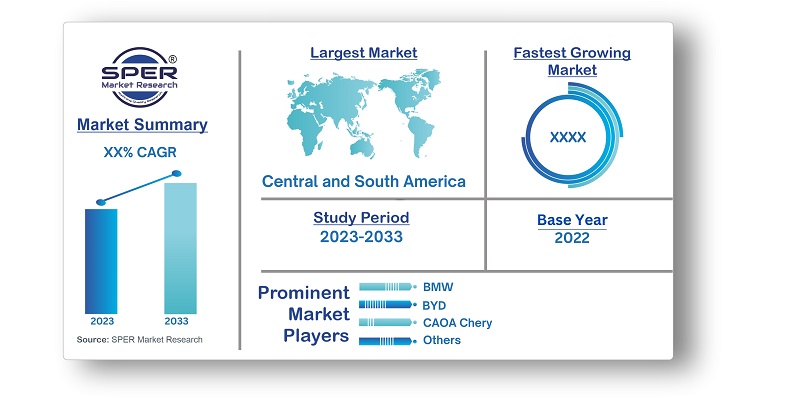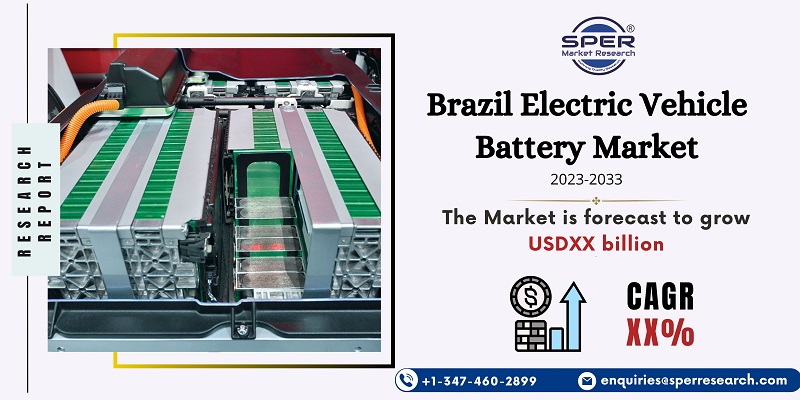
Brazil Electric Vehicle Battery Market Size, Growth, Trends, Revenue, Demand and Future Outlook
Brazil Electric Vehicle Battery Market Growth, Trends, Analysis, Size- By Vehicle Type, By Propulsion Type, By Battery Type, By Distribution Channel- Regional Outlook, Competitive Strategies and Segment Forecast to 2033
| Published: Jan-2024 | Report ID: AMIN2409 | Pages: 1 - 107 | Formats*: |
| Category : Automotive & Transportation | |||
- With a key product, Volkswagen hopes to gain a lot of ground in Brazil and South America. The company intends to grow by 40% in Brazil, the region's largest EV market, by 2027. In other words, 15 new electric and flex-fuel car models are scheduled to be introduced by 2025.
- Nearly every automaker operating in Brazil intends to continue offering ethanol in some capacity, and VW stated in 2021 that it was opening a research and development centre in Brazil to investigate expanding the applications of ethanol and other biofuels in emerging markets.


| Report Metric | Details |
| Market size available for years | 2019-2033 |
| Base year considered | 2022 |
| Forecast period | 2023-2033 |
| Segments covered | By Vehicle Type, By Propulsion, By Battery Type, By Distribution Channel. |
| Regions covered | Southeast, South, Northeast, North, Central-West |
| Companies Covered | BMW, BYD, CAOA Chery, JAC Motors, Nissan, Renault, Volkswagen Group |
- Automobile Manufacturers
- Battery Manufacturers
- Investors and Financial Institutions
- Consumers
- Environmental Organizations
| By Vehicle Type: | |
| By Propulsion: | |
| By Battery Type: | |
| By Distribution Channel: |
- Brazil Electric Vehicle Battery Market Size (FY’2023-FY’2033)
- Overview of Brazil Electric Vehicle Battery Market
- Segmentation of Brazil Electric Vehicle Battery Market By Vehicle Type (Commercial Vehicle, Passenger Car, Two-Wheeler)
- Segmentation of Brazil Electric Vehicle Battery Market By Propulsion (Battery Electric Vehicle, Hybrid Electric Vehicle, Plug-In Hybrid Electric Vehicle)
- Segmentation of Brazil Electric Vehicle Battery Market By Battery Type (Lead Acid Battery, Lithium Ion Battery, Nickel Metal Hydride Battery)
- Segmentation of Brazil Electric Vehicle Battery Market By Distribution Channel (Banks, NBFCs, OEMs)
- Statistical Snap of Brazil Electric Vehicle Battery Market
- Expansion Analysis of Brazil Electric Vehicle Battery Market
- Problems and Obstacles in Brazil Electric Vehicle Battery Market
- Competitive Landscape in the Brazil Electric Vehicle Battery Market
- Impact of COVID-19 and Demonetization on Brazil Electric Vehicle Battery Market
- Details on Current Investment in Brazil Electric Vehicle Battery Market
- Competitive Analysis of Brazil Electric Vehicle Battery Market
- Prominent Players in the Brazil Electric Vehicle Battery Market
- SWOT Analysis of Brazil Electric Vehicle Battery Market
- Brazil Electric Vehicle Battery Market Future Outlook and Projections (FY’2023-FY’2033)
- Recommendations from Analyst
1.1. Scope of the report1.2. Market segment analysis
2.1. Research data source2.1.1. Secondary Data2.1.2. Primary Data2.1.3. SPER’s internal database2.1.4. Premium insight from KOL’s2.2. Market size estimation2.2.1. Top-down and Bottom-up approach
2.3. Data triangulation
4.1. Driver, Restraint, Opportunity and Challenges analysis4.1.1. Drivers4.1.2. Restraints4.1.3. Opportunities4.1.4. Challenges4.2. COVID-19 Impacts of the Brazil Electric Vehicle Battery Market
5.1. SWOT Analysis5.1.1. Strengths5.1.2. Weaknesses5.1.3. Opportunities5.1.4. Threats5.2. PESTEL Analysis5.2.1. Political Landscape5.2.2. Economic Landscape5.2.3. Social Landscape5.2.4. Technological Landscape5.2.5. Environmental Landscape5.2.6. Legal Landscape5.3. PORTER’s Five Forces5.3.1. Bargaining power of suppliers5.3.2. Bargaining power of buyers5.3.3. Threat of Substitute5.3.4. Threat of new entrant5.3.5. Competitive rivalry5.4. Heat Map Analysis
6.1. Brazil Electric Vehicle Battery Market Manufacturing Base Distribution, Sales Area, Product Type6.2. Mergers & Acquisitions, Partnerships, Product Launch, and Collaboration in Brazil Electric Vehicle Battery Market
7.1. Brazil Electric Vehicle Battery Market Value Share and Forecast, By Vehicle Type, 2023-20337.2. Commercial Vehicle7.3. Passenger Car7.4. Two-Wheeler
8.1. Brazil Electric Vehicle Battery Market Value Share and Forecast, By Propulsion, 2023-20338.2. Battery Electric Vehicle8.3. Hybrid Electric Vehicle8.4. Plug-In Hybrid Electric Vehicle
9.1. Brazil Electric Vehicle Battery Market Value Share and Forecast, By Battery Type, 2023-20339.2. Lead Acid Battery9.3. Lithium Ion Battery9.4. Nickel Metal Hydride Battery
10.1. Brazil Electric Vehicle Battery Market Value Share and Forecast, By Distribution Channel, 2023-203310.2. Banks10.3. NBFCs10.4. OEMs
11.1. Brazil Electric Vehicle Battery Market Size and Market Share
12.1. Brazil Electric Vehicle Battery Market Size and Market Share By Vehicle Type (2019-2026)12.2. Brazil Electric Vehicle Battery Market Size and Market Share By Vehicle Type (2027-2033)
13.1. Brazil Electric Vehicle Battery Market Size and Market Share By Propulsion (2019-2026)13.2. Brazil Electric Vehicle Battery Market Size and Market Share By Propulsion (2027-2033)
14.1. Brazil Electric Vehicle Battery Market Size and Market Share By Battery Type (2019-2026)14.2. Brazil Electric Vehicle Battery Market Size and Market Share By Battery Type (2027-2033)
15.1. Brazil Electric Vehicle Battery Market Size and Market Share By Distribution Channel (2019-2026)15.2. Brazil Electric Vehicle Battery Market Size and Market Share By Distribution Channel (2027-2033)
16.1. Brazil Electric Vehicle Battery Market Size and Market Share By Region (2019-2026)16.2. Brazil Electric Vehicle Battery Market Size and Market Share By Region (2027-2033)16.3. Southeast Region16.4. South Region16.5. Northeast Region16.6. North Region
16.7. Central-West Region
17.1. BMW17.1.1. Company details17.1.2. Financial outlook17.1.3. Product summary17.1.4. Recent development17.2. BYD17.2.1. Company details17.2.2. Financial outlook17.2.3. Product summary17.2.4. Recent developments17.3. CAOA Chery17.3.1. Company details17.3.2. Financial outlook17.3.3. Product summary17.3.4. Recent developments17.4. JAC Motors17.4.1. Company details17.4.2. Financial outlook17.4.3. Product summary17.4.4. Recent developments17.5. Nissan17.5.1. Company details17.5.2. Financial outlook17.5.3. Product summary17.5.4. Recent developments17.6. Renault17.6.1. Company details17.6.2. Financial outlook17.6.3. Product summary17.6.4. Recent developments17.7. Volkswagen Group17.7.1. Company details17.7.2. Financial outlook17.7.3. Product summary17.7.4. Recent developments17.8. Others
SPER Market Research’s methodology uses great emphasis on primary research to ensure that the market intelligence insights are up to date, reliable and accurate. Primary interviews are done with players involved in each phase of a supply chain to analyze the market forecasting. The secondary research method is used to help you fully understand how the future markets and the spending patterns look likes.
The report is based on in-depth qualitative and quantitative analysis of the Product Market. The quantitative analysis involves the application of various projection and sampling techniques. The qualitative analysis involves primary interviews, surveys, and vendor briefings. The data gathered as a result of these processes are validated through experts opinion. Our research methodology entails an ideal mixture of primary and secondary initiatives.



Frequently Asked Questions About This Report
PLACE AN ORDER
Year End Discount
Sample Report
Pre-Purchase Inquiry
NEED CUSTOMIZATION?
Request CustomizationCALL OR EMAIL US
100% Secure Payment






Related Reports
Our Global Clients
Our data-driven insights have influenced the strategy of 200+ reputed companies across the globe.




















